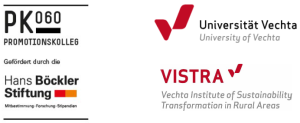PhD Position: Material Stocks and Flows of Provisioning Systems Embedded in Global Production-Consumption Networks
The Institute of Social Ecology at BOKU University, Vienna, announces an open PhD researcher position in the field of advanced socio-metabolic modelling of stocks and flows associated with provisioning systems embedded in global production-consumption networks. This position is part of the project ‘Resilience and Malleability of Social Metabolism’ (REMASS), a 5-year collaboration among six leading Austrian research institutions, funded by the Austrian Science Fund. REMASS aims to investigate the impacts of global supply chain disruptions – caused by factors such as wars, pandemics, and climate extremes – on resource use, inequality, and social well-being.
Context: Provisioning systems include biophysical (infrastructures, buildings, machinery, etc.) and socioeconomic (institutions, organizations, actors, etc.) elements involved in providing societies with services that are of key importance for wellbeing. Ambitious global sustainability goals related to climate or biodiversity hinge on structural transformations of provisioning systems related to housing, mobility or nutrition. Such transformations will have repercussions for global economic structures. Systems of production and consumption underlying the provision of these services are interlinked across the world economy, and these linkages are increasingly threatened by supply chain disruptions related to conflicts, climate impacts, pandemics or other events. Such events, just as efforts to forge more sustainable provisioning systems, may induce non-linear dynamics, structural breaks and unexpected transition phenomena. These systems can be understood as complex networks, spanning a multitude of sectors across many countries, which are ultimately tied to the use and consumption of final products and services in specific locations.
Tasks of the PhD researcher: As a member of an interdisciplinary team at the Institute of Social Ecology and within the REMASS consortium, the PhD researcher will apply and further develop existing modelling approaches to the analysis of provisioning systems embedded in global production-consumption networks. This will be done by combining several modelling approaches: The Material Inputs, Stocks and Outflows (MISO) model available at SEC will have to be further developed, and combined with environmentally-extended or physical Multi-Regional Input-Output (MRIO) models available within the REMASS consortium. The work of the PhD researcher is also expected to contribute to the development of a novel agent-based environmental macro-economic model run by another REMASS partner that will be able to simulate non-linear socioeconomic transition dynamics. Collaboration skills will be key, as the candidate will work closely with another PhD candidate at WU, as well as other researchers in the REMASS consortium.
Responsibilities:
- Further develop the MISO model to enable assessment of biophysical resource requirements and accumulation of material stocks associated with selected provisioning systems. These assessments aim to explicitly consider thermodynamic consistency criteria, i.e. mass-balance all physical stock-flow processes
- Assess resource requirements and stocks accumulation related to provisioning systems through the global economy by application of MRIO models available in the consortium (e.g. EXIOBASE, GLORIA), in collaboration with researchers at WU
- Contribute to the development of a novel agent-based environmental macroeconomic model, in particular related to material stocks and flows associated to economic transactions represented in this model, in collaboration with researchers at the Institute of Social Ecology and other REMASS partners.
- Contribute to methodological developments related to all three modelling approaches
- Apply new/improved models to specific provisioning systems, in collaboration with other REMASS partners
- Collaborate with colleagues working on provisioning systems from a political ecology perspective on case studies on key services, e.g. nutrition, shelter & mobility
- Set up and maintain databases and code structures ensuring accessibility through public repositories such as Zenodo or GitHub
- Lead drafting of manuscripts for submission to international scholarly peer-review journals.
Qualifications
- Excellent MSc degree in a relevant field (e.g., industrial ecology, ecological economics or related interdisciplinary sustainability sciences).
- Proficiency in programming, particularly in PYTHON.
- Experience in sociometabolic research and input-output analysis.
- Keen interest in the sustainability of provisioning systems, global supply chains and tipping points.
- Enthusiasm for analytical thinking, data analysis and high-quality research.
- Demonstrated experience in academic writing and publishing.
We offer
- Being part of a cutting-edge research project that aims at new insights into global sustainability challenges.
- Working within a dynamic and interdisciplinary team of leading experts.
- A 3-year PhD position starting October 1st, 2024, with an employment contract of 30 hours/week; an elongation to a 4-year position may be negotiable under certain conditions.
- Compensation is in accordance with the Austrian collective agreement for university employees, with a gross salary of 2,700-3,200 Euro per month and 14 annual pays.
- Excellent working conditions, modern facilities, and a friendly and supportive working environment.
We invite you to apply if you are passionate about advancing research in global supply chain assessments and sustainability. Please send your application, including your CV, a cover letter explaining your motivation for this position, university grades and certificates, examples of your work (e.g., PYTHON scripts, your GitHub account, Zenodo archives, a scientific manuscript), and contact information for two references to Prof. Helmut Haberl (helmut.haberl@boku.ac.at) until August 5th, 2024 at the latest.
It was originally posted on the Alumni Verbindungen furs Leben website.



